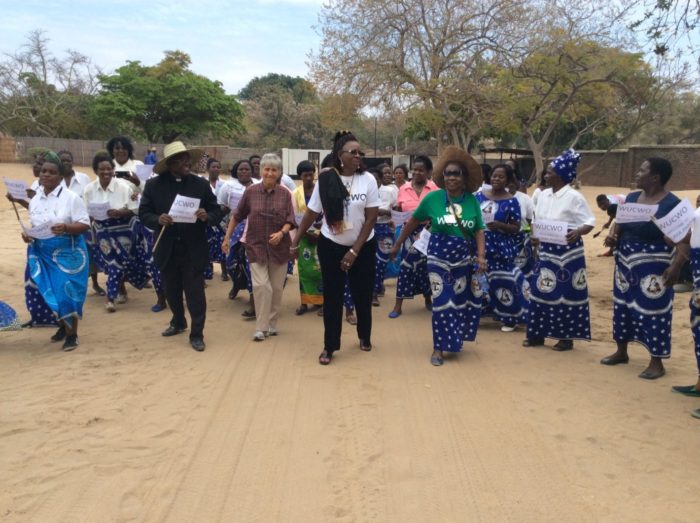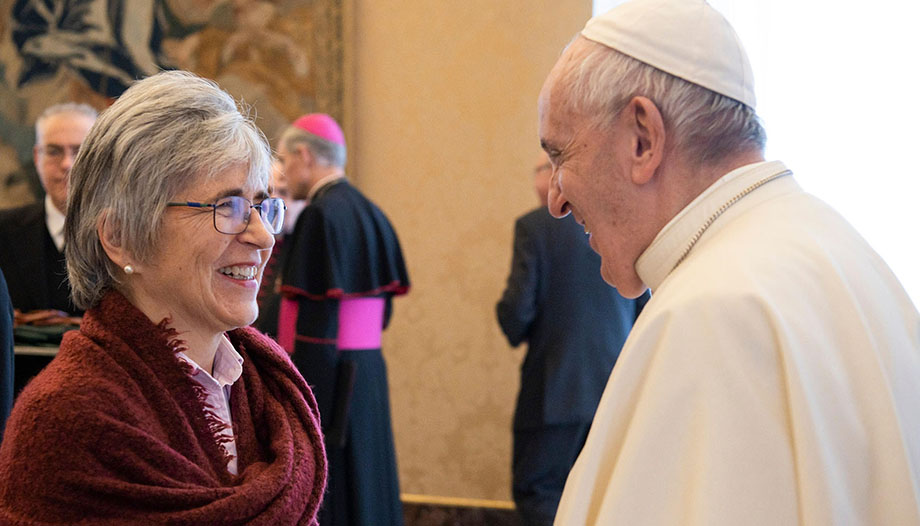The World Union of Catholic Women's Organizations (WUCWO) was founded in 1910 and today is spread across all continents and has more than eight million affiliated women whose objective is to support programs and projects aimed primarily at the defense and dignity of women.
For more than a hundred years of promoting and defending women throughout the world, in the most diverse social, political and economic environments. Maria Lia Zervino, president of the organization, which was recognized by the Holy See as an International Public Association of the Faithful in 2006, explains that it is a source of pride and boast for the entire Church.
"From the very beginning, the visionary foundresses were present at the international level. In 1928, these women were already working in the League of Nations, in the commissions of Trafficking of Women and Protection of Children. Their impact and prestige both for the propagation of the faith and for the protection of the family were such that, during the Second World War, they had to burn their archives to avoid persecution; unfortunately, their Ecclesiastical Assistant died as a result of torture," Zervino points out.
A fruitful ecclesial action that led Paul VI to "appoint as president of the organization the Spaniard Pilar Bellosillo, present in the first group of women auditors of the Second Vatican Council and whose cause for beatification is now in progress," recalls Maria Lia Zervino.
What are the objectives of the World Union of Catholic Women's Organizations and how is the organization structured to achieve them?
- WUCWO focuses on the dignity of women. Its purpose is to promote the presence, participation and co-responsibility of Catholic women in society and in the Church, so that they may be protagonists, together with men, in evangelization and integral human development. That is why it associates Catholic organizations (mixed or exclusively feminine) always represented by a woman. Practically all the members are lay women, although many religious women are part of its organizations and it also gathers associations of consecrated women.
Who is part of this organization?
- The delegates of the organizations participate in the General Assembly every 4 years and democratically elect the members of the Council. This collegiate body votes for the members of the Executive Committee: the vice-presidents of each region and finally the president, who is located at the bottom of the pyramid. The governing bodies that form part of the inverted pyramid are at the service of WUCWO member organizations.
The Dicastery for the Laity, Family and Life also participates in this process as it can veto a candidate for president, but cannot choose who will occupy that position.
WUCWO is an existential observatory of women in the world and a reflection of what is happening throughout the Church. WUCWO's greatest human growth is in Africa and it is experiencing a certain decline in some European countries, as is the case at the global ecclesial level. The organizations with the highest number of young women are found on the African continent and in some countries of Asia-Pacific and Latin America.
In the North American region, the situation has not changed significantly in recent years. WUCWO can be said to be a mosaic of cultures of very diverse women who are united in a common love for the Church and a desire to apply and contribute to its teachings. To its ecumenical initiatives, since 2019 it has added a path of dialogue with women of other faiths - who are also leaders of their respective communities - and together they celebrate International Women's Day each year.
What are the objectives for the near future?
- There are three objectives for the near future: to grow in synodality, to create synergy with women in countries where it is not possible to associate and to give visibility to those women who seem invisible.
With regard to synodality, the objective is twofold: on the one hand, to contribute to the Synod on Synodality in each diocesan, continental and universal phase and, on the other hand, to incarnate it within WUCWO.
Among the tasks to be undertaken in synodal style, a central place is occupied by the preparation of the WUCWO World Women's Meeting with Pope Francis on May 13, 2023, which will be the threshold from which to illuminate the General Assembly to be held later in Assisi.
In order to create synergy with Catholic women in some countries, usually Muslim, whose governments do not allow them to associate, we will hold the III Meeting with Women from the Middle East and Mediterranean in October this year in Athens, a process we started in Amman (2013) and continued in Bari (2016). "Women peacemakers in a Church. outbound"will make it a priority to listen to women, in addition to sharing the update of the Amoris laetitia and dream together of the post-Covid 19 scenario, within the framework of a culture of peace.
In order to give visibility to women from different parts of the world, who normally seem invisible to many as a result of what the Pope calls the globalization of indifference, WUCWO created the World Observatory of Women in 2021.

The World Observatory of Women has recently been launched: what does it consist of and what are its objectives?
- It is a new project and is intended for the short and long term. The motto of the World Women's Observatory (WWO) is "Listening to transform lives".
It consists precisely in listening to women from different regions of the world on a particular topic, offering them the opportunity to express themselves and have their voices heard. To gather their experiences of suffering and deprivation, as well as their strengths and good practices, in order to systematize them in a format with academic rigor that allows their dissemination in an accessible language.
The second phase of the Observatory's work is the dissemination and awareness-raising at the local, national and international levels, in order to inspire and generate pastoral strategies on the part of the Church; synergies on the part of civil society NGOs; public policies on the part of States and contributions to the international agenda that favor the integral human development of women and that of their families, communities and peoples.
The WWO is destined to be the international reference point from which to visualize and evaluate alternatives for transformation in the area of women in different parts of the world. Its vision is integral and universal, that is to say, it identifies with the magisterium of the Church, in particular with Laudato si and with Fratelli tutti. It is at the service of all Church structures and other organizations, including non-denominational ones.
This Observatory, as a first act, presented a survey to know the impact of Covid 19 on women in the world. What were the results?
- The WWO carried out its first work Impact of Covid-19 on women in Latin America and the Caribbean. According to the studies collected, as well as to the field experts consulted and the thousands of surveys conducted, the main effect of the pandemic on the situation of women in the region was the deepening and aggravation of pre-existing structural social, economic and cultural inequalities, such as the increase in gender-based violence, the deterioration of economic autonomy, the worsening of the feminization of poverty, the deterioration of physical and mental health, the increase in caregiving tasks, the difficulties in education aggravated by social differences, the increase in human trafficking and organized crime, among other indicators.
Their strengths and resilience also emerged, such as reinventing ways of subsistence for their families and ways of marketing their products, the creation of solidarity networks for the care of the elderly or those most in need during the pandemic, new forms of prayer and spiritual accompaniment.
And a series of creative proposals emerged, including training for female leadership in all areas, the representation of women in public spaces - betting on collaboration rather than competition -, research and dissemination on structural and symbolic violence, a strategy for the prevention of violence working, from childhood, for equal rights between men and women, the improvement of education, including digital education, and the reform of systems of access to justice for the most vulnerable women.
How can the World Union of Catholic Women's Organizations help women find space and visibility also in the ecclesial context?
- WUCWO contributes to the formation of women so that they can find their place and provide quality service in the various sectors of the Church. To this end, it has made intensive use of the two years of the pandemic to train its women and its collaborators in English, Spanish and French on the major themes of the current magisterium. It has counted on the teaching and accompaniment of specialists in each of the themes that have to do with its resolutions for the present period: responsibility before integral ecology, protection of the family and in particular of its most vulnerable members, violence and discrimination against women, and education for the path to holiness.








